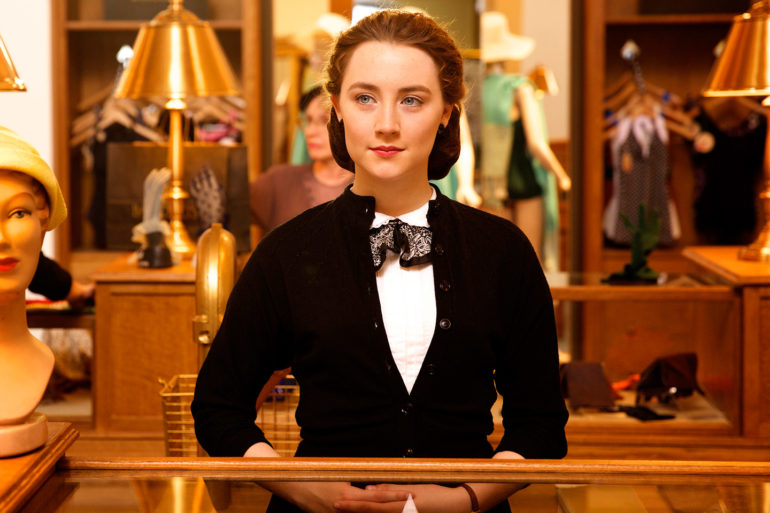Featuring a stellar Saoirse Ronan as young emigrant Éilis Lacey, Brooklyn tracks one young woman’s attempt to discover a sense of self as she journeys from her small town existence in Enniscorthy, Wexford, to Brooklyn, New York in the 1950s. Director John Crowley may often shoot with rose-tinted lenses, yet thanks to some wonderful performances and Nick Hornby’s balanced screenplay, the warmth at Brooklyn’s core gradually wins you over, an emotionally involving tale of one woman’s crisis of personality.
Leaving behind her doting sister (Fiona Glascott) and mother (Jane Brennan), Éilis settles in the boarding house kept by Julie Walters’ scene-stealing Mrs. Kehoe. Initially struggling to find her feet, things begin to look up following a chance meeting with smouldering, Brando-aping Italian-American Tony (Emory Cohen). Yet, following a traumatic event back home, Éilis is forced to return for a brief period, finding upon arrival that she’s very much expected to stay, not to mention fielding an unexpected, unshakeable connection with prosperous Jim Farrell (Domhnall Gleeson). If this arc sounds a little familiar, Brooklyn’s execution only reinforces the traditional values at the story’s heart. Crowley’s direction favours slow dissolves between scenes that recall films of the period, the heightened performance styles of supporting characters like Jim Broadbent’s sympathetic Father Flood and Walter’s Mrs. Kehoe occasionally threatening to spill over into caricature. Taken as a whole however, these tendencies ultimately works to the film’s advantage, a throwback quality lending Crowley’s film a sense of warmth and timelessness. It’s a film primarily concerned with a woman’s conflicting relationship with tradition, and stylistically, Brooklyn is steeped in it.
Formerly best known for his depictions of foppish English males, Hornby makes it three for three by once again successfully inhabiting a female perspective, following screenplays for An Education and Wild. Brooklyn skews broad in its occasionally postcard approach to Irish-ness. Enniscorthy and boarding house scenes see classic mammy-isms rattled out (“I’ll have to leave a key out, you’re not waking me up at that hour”). As you’d expect, Walters devours the OTT stylings of Mrs. Kehoe with gusto. Irish audiences may crack a chuckle. Internationally, they’ll be rolling in the aisles.
Brooklyn’s melodramatic tone might put off the more cynical, not least in the sequence of events that cause Éilis to return to Ireland, yet there is an pleasant ambiguity to how Éilis engages with her Irish identity. Her first Christmas day away from home, she volunteers at a soup kitchen for New York’s lost Irish, culminating in a solemn sing-song and many a distant, downward glance. Moving as the sequence aims to be, it’s undercut with an ambivalence, generating the impression that while she might be able to empathetically engage with the broken dreams her nation’s history, this doesn’t conflict with Éilis’ quiet determination to write her own story. As she finds herself succumbing to mounting pressure to settle at home with Farrell, his gentle, homely nature sees him come to embody the warm tug of the homeland.
Hornby’s focus upon the contradictions and indecision at Éilis’ core make her an occasionally frustrating protagonist, yet ultimately makes Brooklyn a rewarding viewing experience, right through to its somewhat decisive denouement. Frequently framed in close-up, Ronan expertly conveys the sea of conflicts within Éilis. It’s a performance defined by a subtle revelation of the woman Éilis is bound to be, gradually stripping back a guarded exterior as Éilis makes her unsteady steps towards independence.

